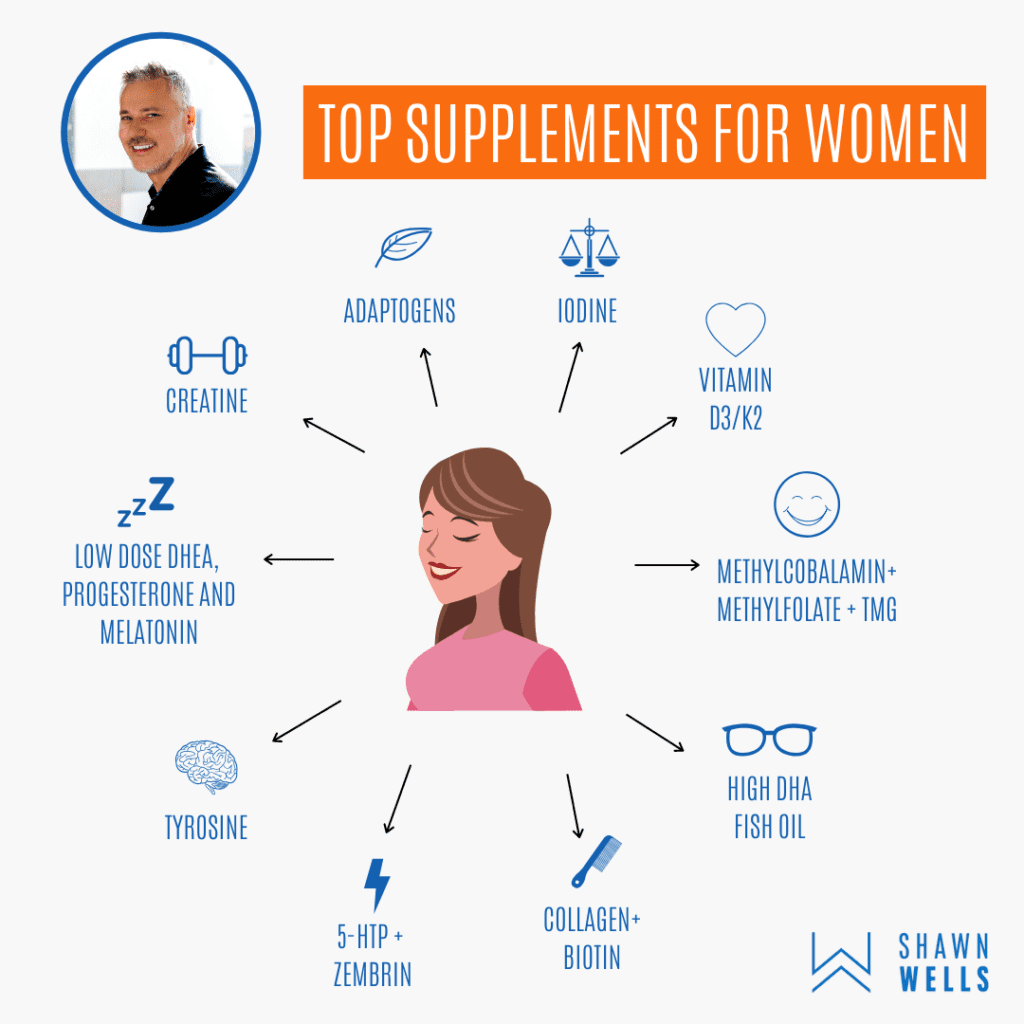Keto diet: Is it different for women? A guide

Check here part 1 of this article where we cover fasting for women.
The ketogenic diet & women
There is so much hype around the keto diet, and for good reason! It shows promising results for improving metabolic health mainly by regulating hormones and improving sensitivity to the hormones insulin and leptin. It is also an alternative way to fasting to improve metabolic flexibility. With that said, women are more sensitive to changes in dietary intake, and fluctuations in weight. This makes it reasonable to say that sustaining a keto diet may be more of a challenge for women.
The hallmark of the keto diet is the restriction of carbohydrates, usually below 50 grams per day, which stimulates the breakdown of fat and the production of ketones in the body. Although you may be consuming adequate calories on the keto diet, the extremely low amounts of carbohydrates can be received as a stress to the body, especially if adhered to for long periods of time.
This is exactly why keto works! Your body is deprived of the readily available energy source; carbohydrates and this, like fasting, is seen as a stress, and so it looks to burn fat stores for fuel instead. On top of the stress, you’re likely to lose a significant amount of weight, in a short space of time – another factor that can lead to female hormone imbalances.
The argument for a very high fat keto diet is usually: “But fats are what our hormones are made from and so the more the better.” This is true, although you can still have a sufficient amount of healthy fats in your diet and still include some carbohydrates too, so that your body doesn’t perceive stress all the time.
A ketogenic diet, when done long-term and especially in women that are already stressed out and have a low percentage body fat, can counteract some of its benefits. Luckily, the possible negative consequences of the keto diet can be avoided by simply practicing some sort of carb-cycling or a switch to a ‘cyclical ketogenic diet’. This simply means adding in carbohydrates only on certain days of the week or at certain stages of the menstrual cycle, whilst maintaining strict keto on the other days.
Carb-cycling
It is completely normal to see fluctuations in blood glucose, insulin and even ketone readings during a cycle. Most commonly seen is lower blood glucose readings after day 1 of menstruating and before ovulation, with higher readings during the second half of the luteal phase. Progesterone is known to reduce insulin sensitivity, and could be the reason for this pattern. Oral contraceptives also have an impact on this, however, and so women may experience different patterns.
With changes in blood glucose and insulin sensitivity, ketone readings can differ throughout the month too, which tends to coincide with carb cravings and some weight gain. This is normal physiology and perhaps adding in a few carbs during this time as opposed to working against it could be beneficial.
The reason women may want to include more carbohydrates in their keto diet can be explained by the role and mechanism behind leptin in the reproductive system. Leptin is essential for controlling energy balance and having too much or too little can clearly cause hormonal imbalances. It is produced by the intestine and by fat cells and is secreted in response to consuming fat. Overweight and obese individuals have excess leptin and the keto diet naturally reduces leptin levels with the production of ketones and breakdown of body fat.
Women leading a high-stress lifestyle, with already low body fat who follow a long term keto diet are far more susceptible to a major decline in leptin. When leptin is too low for a period of time, it also requires an insulin and glucose surge to signal to the body that it has been fed. Fat alone won’t do the trick. That is why introducing carbs into the diet helps to avoid a decline in leptin levels, maintaining proper metabolic balance.
A few questions can help determine whether someone needs more carbs:
- Are you active and do you frequently do HIIT or endurance based workouts?
- Do you have a regular menstrual cycle?
- Has your cycle length changed on keto?
- Do you feel tired and fatigued?
- Have you started to gain weight?
- Do you have insomnia?
- Do you feel anxious or wired?
- Are you recovering well from your workouts?
- Do you have thyroid or adrenal issues?
- How long have you been fully keto?
If the answer to any of those is ‘yes’, then considering adding in a few more carbohydrates is a good idea. The benefits of ketosis can still be achieved but without having to add in carbohydrates daily, by following a cyclical ketogenic diet.
How much is a good amount of carbs for females?
The answer, much like the answer to how long and how frequently females should fast, is that it varies from person to person. On a keto diet, a typical amount of carbohydrates could be anywhere from 20 to 60 grams per day. A good amount to aim for is 75-120 grams per day, so adding roughly 45-60 grams more per day, typically for two days for the cycle. The key is to send the signal to the hypothalamus that energy is not scarce and that it is safe for reproduction!
Low-glycemic, paleo friendly and nutrient dense sources of carbs. For example, sweet potatoes, beetroots, squash, berries, raw honey and dates are good sources of carbs. It is important to schedule these carb increases into a diet to avoid associating a strategic carb refeed with a ‘cheat’ meal. Planning to eat more carbs on specific days on the month can help to dissociate the guilt that may come with it.
The times of the month women should up their carbs!
Fluctuations in body weight, energy levels and blood glucose and insulin are known to occur across the cycle. Women who are in tune with their bodies can sense when they’re likely to tolerate carbs slightly better. However, for those with hormone imbalances, knowing when leptin levels are lowest can help to avoid leptin depletion, which sends a signal of metabolic stress to the body.
Leptin levels are lowest on:
- Day 1 and 2
- Five days post ovulation (days 18/19)
Planning a carb ‘refeed’ during these times of the cycle can help to maintain adequate levels of leptin, and also help support progesterone which is often lower in overly stressed women. Pregnenolone is the precursor to both progesterone and cortisol. In women under a high allostatic load, it is common to see pregnenolone favoring cortisol production, resulting in low progesterone. Upping carb intake can help minimize the stress and reliance on your adrenal glands to overproduce cortisol.
Additionally, it is best to have the carbs towards the evening to support melatonin and serotonin production that aids in activating the parasympathetic nervous system for optimal sleep and recovery.
It is important to rule out any nutritional or caloric deficits when on keto. If disruptions in hormones persist while following a keto diet and practicing fasting, then it is a good idea to scale back on these. Adopting a more balanced and perhaps paleo based diet may help to reset hormonal imbalances.
Are there supplements to help with reproductive health?
YES! Although nutrition is extremely important for overall reproductive and metabolic health, there are some supplements that can help to reset hormone levels if they have gone a little out of whack because of too much stress.
Here is a list that the World’s Greatest Formulator, Shawn Wells, recommends all women should consider:

- Adaptogens: Herbs and roots that increase our resistance to stress and maintain homeostasis in the body.
- Rhodiola – reduce physical & mental fatigue, lower anxiety
- Ashwagandha – reduce stress & anxiety
- Maca – improve mood & energy, boost libido
- Vitamin D3/K2 – bone & heart health
- Collagen + Biotin – skin, hair & nails
- Methylcobalamin + methylfolate + TMG
- Zembrin – relieves stress, anxiety & enhances mood
- 5-HTP – increases serotonin production
- Iodine (Bladderwrack) – thyroid health
- Tyrosine – improve mood, focus and alertness
- Low dose DHEA, progesterone & melatonin – supports healthy hormone balance & optimal sleep
- Creatine – strengthens muscle, prevents sarcopenia, supports methylation, protects bone, eye and brain health and is a potent antioxidant
So, what is the bottom line?
Although there may be no clear cut answers here, this at leasts starts the conversation about women and fasting, and how important it is to account for their differences. Considering the individual stress load is probably the most important place to start when looking at practicing fasting or the keto diet for health reasons. The signal of scarcity is sent to the brain when energy is limited disrupting all of the hormones that naturally control energy balance in the body. The first system that gets shut down to conserve more energy is the reproductive system.
Fasting or keto itself is not the problem. It is the accumulation of several life stressors that add to a person’s overall allostatic load that can take fasting from a healthy practice to a harmful one. And, because the thyroid and adrenal glands are sensitive to sex hormone levels and energy balance, more issues arise than what would be expected.
By controlling all other sources of stress, like work, sleep, relationships, exercise and environmental stressors, fasting and keto can be safe and beneficial for women. Women are physiologically UNIQUE, and it is so important to keep the conversation going and to not suppress the topic.
Key Takeaways:
- Women & Fasting
There is some concern as to whether fasting can affect women’s menstrual cycles (and female hormones). While further research is needed, any negative effects are likely related to a woman’s allostatic load, as well as their starting weight, overall caloric intake, and the duration of the fast/restriction. - Exercising & Fasting
Research shows that people incorporating intermittent fasting (and other fasting types) can increase strength and endurance and maintain muscle mass when combined with regular resistance training and cardiovascular exercise. But, when it comes to women, doing intense HIIT workouts, CrossFit or any type of extensive exercise may cause more harm than good. Sticking to low intensity exercise or waiting until in a fed state is likely to result in more benefits. - Women & Keto
The benefits of the ketogenic diet are plentiful, however, the keto diet is still placing a stress on the body. The extreme restriction of carbohydrates sends the signal to the body that glucose availability is low and it needs to produce a back-up energy source: ketones. Ketosis has a whole lot of benefits, but when adhered to for too long, it can cause hormonal imbalances. Cycling the ketogenic diet and upping carbohydrate intake at certain times of the month signals to the body that it is safe. - Certain supplements could be necessary here and help improve the body’s response to fasting and the keto diet as well as to exercise, while in a fasted state.
- Simply put, in healthy, normal weight, or obese adults, there is little evidence that fasting, or the keto diet is harmful physically or mentally. Having said that, women that are pregnant, nursing, a lean female, or have a history of any medical condition should either avoid or approach these healthy practices with medical advice.
Recommended Resources:
- Shawn Wells website & Instagram
- Stacy Sims book, Roar
- Jolene Brighten
- Naturally Nourished – Ali Miller
- The Low Carb Athlete – Debbie Potts
- Kion Blog
References
Kumar S, Kaur G (2013) Intermittent Fasting Dietary Restriction Regimen Negatively Influences Reproduction in Young Rats: A Study of Hypothalamo-Hypophysial-Gonadal Axis. PLOS ONE 8(1): e52416. https://doi.org/10.1371/journal.pone.0052416
Heilbronn, L.K., Civitarese, A.E., Bogacka, I., Smith, S.R., Hulver, M. and Ravussin, E. (2005), Glucose Tolerance and Skeletal Muscle Gene Expression in Response to Alternate Day Fasting. Obesity Research, 13: 574-581. doi:10.1038/oby.2005.61
Solianik R, Sujeta A. Two-day fasting evokes stress, but does not affect mood, brain activity, cognitive, psychomotor, and motor performance in overweight women. Behavioural Brain Research. 2018;338:166-172. doi:10.1016/j.bbr.2017.10.028
Martin B, Pearson M, Kebejian L, et al. Sex-dependent metabolic, neuroendocrine, and cognitive responses to dietary energy restriction and excess. Endocrinology. 2007;148(9):4318–4333. doi:10.1210/en.2007-0161
Going Keto? Here’s The One Time Of Month Women Should Eat More Carbs by Ali Miller, R.D., L.D., CDE https://www.mindbodygreen.com/articles/why-women-should-carb-cycle-on-keto-diet
How much is too much…for women? by Debbie Potts https://debbiepotts.net/how-much-is-too-much-for-women/
Keto and the Menstrual Cycle: Is There Reason To Worry? by Lindsay Taylor, PhD https://www.marksdailyapple.com/keto-period/
Intermittent Fasting for Women: What We Know Now by Mark Sisson https://www.marksdailyapple.com/women-and-intermittent-fasting/
The Complete Guide to Fasting for Women Part 1: Should Females Fast? https://getkion.com/articles/fasting-for-women-1/
Share
Who is Shawn Wells?
Although I’ve suffered from countless issues, including chronic pain, auto-immunity, and depression, those are the very struggles that have led me to becoming a biochemist, formulation scientist, dietitian, and sports nutritionist who is now thriving. My personal experiences, experiments, and trials also have a much deeper purpose: To serve you, educate you, and ultimately help you optimize your health and longevity, reduce pain, and live your best life.
ORDER THE ENERGY FORMULA
Discover the 6 foundational pillars to cultivate a more caring, compassionate, connected, unified and purpose-filled life.


